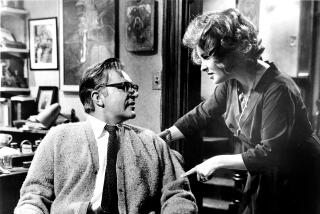MOVIE REVIEW : Hate Is Wrong Emotion for ‘Love and Anarchy’
- Share via
“Love and Anarchy,” which starts the UC Irvine Film Society’s “Offbeat Comedy” series tonight, is credited with putting director Lina Wertmuller’s career in fast motion. It also raised her profile in another way--feminists hated the film, and Wertmuller was branded a traitor to her sex thereafter.
Although her earlier “The Seduction of Mimi” was lauded by critics, “Love and Anarchy” received big-time international attention after its 1973 release. Despite knocks by female activists, Wertmuller had taken a leap from under Fellini’s shadow, where she had been since her apprenticeship as his assistant director on such movies as “8 1/2.”
The film follows Tunin (played by Wertmuller’s usual leading man, Giancarlo Giannini), an idealistic bumpkin with a taste for anarchy, as he stumbles forward in a plan to assassinate Mussolini and topple the fascist government. His handmaiden in this alternately slapstick and desperate adventure is Salome (Mariangela Melato, another Wertmuller staple), a mouthy prostitute and closet revolutionary. Their headquarters is a bawdy Rome bordello populated by a lusty mix of characters.
It’s this harem of hookers that got Wertmuller into trouble. Feminists bristled at the way she presents them, how her camera (in Fellini-esque ways) settles on their exposed bodies, distorting breasts, hips and legs. Their wantonness is as ripe as it gets.
Feminists thought it was all too ripe, in the end demeaning women as cynical sex objects. Wertmuller called the criticisms silly and proclaimed herself a guardian of women’s rights. Her portrayal was truth-telling, not subversive vulgarity; the film only emphasized the culture’s fascination with women as erotic symbols.
Her defense makes sense. Wertmuller’s hookers seem to know more than anyone else in this movie; they’re a step ahead of everything. Especially Salome, and even the younger Tripolina (Lina Polito), who falls in love with Tunin on the eve of his assignment. In their own way, they’re as heroic as he is.
Besides, “Love and Anarchy” is more interested in making more direct political statements about man’s inability to effect change in his world. Wertmuller, a socialist and one of Italy’s most political filmmakers, uses the movie’s absurdist comic tone to voice frustrations--Tunin’s brutality underscores the hopelessness of the lower class.
The movie wouldn’t be as successful if not for Giannini’s performance. With his Chaplin walk and staring, uncomprehending eyes, he’s a sad clown, noble but also silly. Melato, with her loud, colorful talk and cat’s eyes, provides a dynamic contrast.
Lina Wertmuller’s “Love and Anarchy” screens tonight at 7 and 9 p.m. in UC Irvine’s Student Center Crystal Cove Auditorium. Tickets: $4. Information: (714) 856-6379.
More to Read
Only good movies
Get the Indie Focus newsletter, Mark Olsen's weekly guide to the world of cinema.
You may occasionally receive promotional content from the Los Angeles Times.










